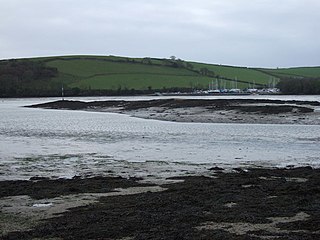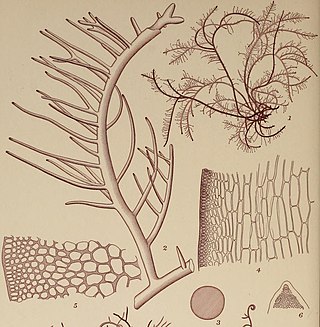
Chordariaceae is a family of brown algae. Members of this family are may be filamentous, crustose with fused cells at the base, or they may be terete and differentiated into a central medulla and an outer photosynthetic cortex. They have a sporphytic thallus usually aggregated to form a pseudo-parenchyma.

Dictyotales is a large order in the brown algae containing the single family Dictyotaceae. Members of this order generally prefer warmer waters than other brown algae, and are prevalent in tropical and subtropical waters thanks to their many chemical defenses to ward off grazers. They display an isomorphic haplodiploid life cycle and are characterized by vegetative growth through a single apical cell. One genus in this order, Padina, is the only calcareous member of the brown algae.

The Delesseriaceae is a family of about 100 genera of marine red alga.

Halymenia a genus of a macroscopic red algae that grows in oceans worldwide.

Rhodomelaceae is estimated to be the largest red algae family, with about 125 genera and over 700 species.

Rhodymenia is a genus of red algae, containing the following species:

Laurencia is a genus of red algae that grow in temperate and tropical shore areas, in littoral to sublittoral habitats, at depths up to 65 m (213 ft).

Kallymeniaceae is a red algae family in the order Gigartinales.

Chondria is a red alga genus in the family Rhodomelaceae.

Hypnea is a genus of red algae, and a well known carrageenophyte.

The Botany of Lord Auckland's Group and Campbell's Island is a description of the plants discovered in those islands during the Ross expedition written by Joseph Dalton Hooker and published by Reeve Brothers in London between 1844 and 1845. Hooker sailed on HMS Erebus as assistant surgeon. It was the first in a series of four Floras in the Flora Antarctica, the others being the Botany of Fuegia, the Falklands, Kerguelen's Land, Etc. (1845–1847), the Flora Novae-Zelandiae (1851–1853), and the Flora Tasmaniae (1853–1859). They were "splendidly" illustrated by Walter Hood Fitch.

Phyllophora is a genus of red algae in the family Phyllophoraceae.

Acrosorium is a genus of marine red algae.

Callithamniaceae is a family of red algae (Rhodophyta) in the order Ceramiales. The family was first described by Friedrich Traugott Kützing in 1843.

Spatoglossum is a marine brown algal genus in the family Dictyotaceae, with a worldwide distribution

Callithamnion is a genus of algae belonging to the family Callithamniaceae.















